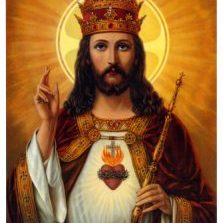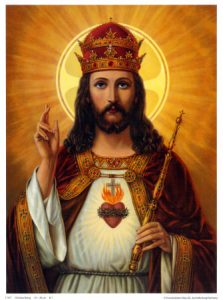
Feast of the Kingship of Our Lord Jesus Christ
Last Sunday in October
[Excerpts from “Quas Primas” (On the Kingship of Christ) by Pope Pius xi, Dec,11,1925.]
Let Us expain briefly the nature and meaning of this Lordship of Christ. It consists, We need scarcely say, in a threefold power which is essential to lordship. This is sufficiently clear from the Scriptural testimony already adduced concerning the universal dominion of our Redeemer,and moreover it is a dogma of faith that Jesus Christ was given to man, not only as our Redeemer but also as a Law-giver, to whom obedience is due.[24] Not only do the Gospels tell us that He made laws, but they present Him to us in the act of making them. Those who keep them show their love for their Divine Master, and He promises that they shall remain in His love.[25] He claimed judicial power as received from His Father, when the Jews accused Him of breaking the Sabbath by the miraculous cure of a sick man. “For neither doth the Father judge any man; but hath given all judgment to the Son.” [26] In this power is included the right of rewarding and punishing all men living, for this right is inseparable from that of judging. Executive power, too, belongs to Christ, for all must obey His commands; none may escape them, nor the sanctions He has imposed. …..

If We ordain that the whole Catholic world shall revere Christ as King, We shall minister to the need of the present day, and at the same time pr
ovide an excellent remedy for the plague which now infects society. We refer to the plague of anti-clericalism, its errors and impious activities. This evil spirit, as you are well aware, Venerable Brethren, has not come into being in one day; it has long lurked beneath the surface. The empire of Christ o
ver nations was rejected. The right which the Church has from Christ Himself, to teach mankind, to make laws, to govern peoples in all that pertains to their eternal salvation, that right was denied. Then gradually the religion of Christ came to be likened to false religions and to be placed ignominiously on the same level with them. It was then put under the power of the state and tolerated more or less at the whim of princes and rulers. Some men went even further, and wished to set up in the place of God’s religion a natural religion consisting in some instinctive affection of the heart. There were even some nations who thought they could dispence with God, and that their religion should consist in impiety and the neglect of God. The rebellion of indiduals and states against the authority of Christ has produced deplorable consequences. We lamented these in the Encyclical ‘Ubi Arcano’; we lament them today: the seeds of discord sown far and wide; those bitter enmities and rivalries between nations, which still hinder so much the cause of peace; that insatiable greed which is so often hidden under a pretense of public spirit and patriotism, and gives rise to so many private quarrels; a blind and immoderate selfishness, making men seek nothing but their own comfort and advantage, and measure everything by these; no peace in the home, because men have forgotten or neglect their duty; the unity and stability of the family undermined; society in a word, shaken to its foundations and on the way to ruin. We firmly hope, however, that the Feast of the Kingship of Christ, which in future will be yearly observerd, may hasten the return of society to our loving Savior. It would be the duty of Catholics to do all they can to bring about this happy result. Many of these, however, have neither the station in society nor the authority which should belong to those who bear the torch of truth. This state of things may perhaps be attributed to a certain slowness and timidity in good people, who are reluctant to engage in conflict or oppose but a weak resistance; thus the enemies of the Church become bolder in their attacks. But if the faithful were generally to understand that it behooves them ever to fight courageously under the banner of Christ their King, then, fired with apostolic zeal, they would strive to win over to their Lord those hearts that are bitter and estranged from Him, and would valiantly defend His rights.
Moreover, the annual and universal celebration of the Feast of the Kingship of Christ will draw attention to the evils which anticlericalicm has brought upon society in drawing men away from Christ, and will also do much to remedy them. While nations insult the beloved Name of our Redeemer by suppressing all mention of it in their conferences and parliaments, we must all the more loudly proclaim His kingly dignity and power, all the more universally affirm His rights.
Quotes
[24]-Council of Trent, Session vi, Canon 21
[25]-Saint John 14:15; 15:10
[26]-Saint John 5:22
Related Libraries
There are no related libraries
Related Articles
There are no related articles